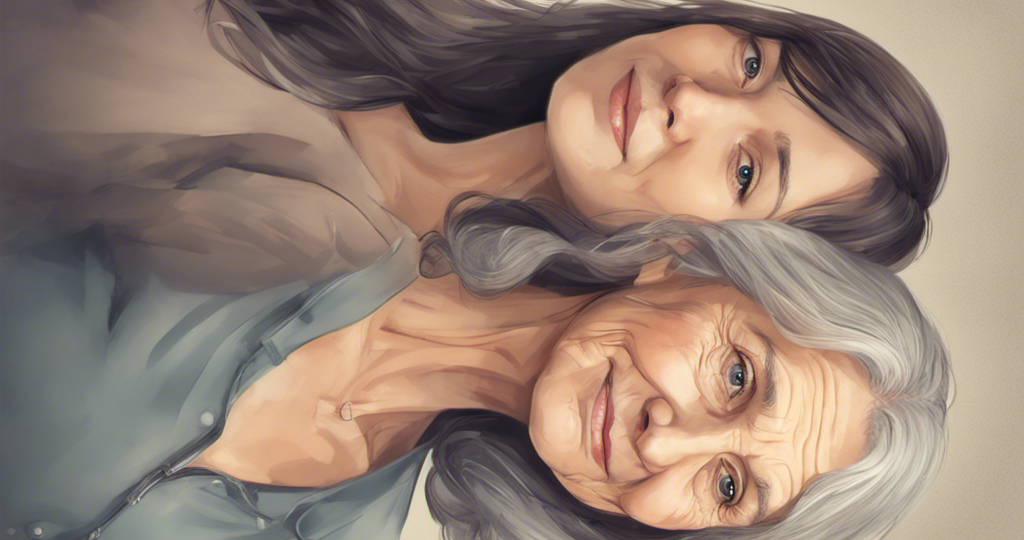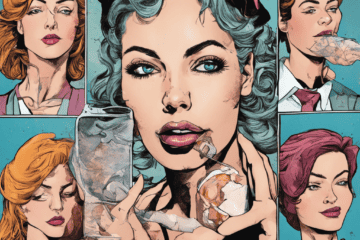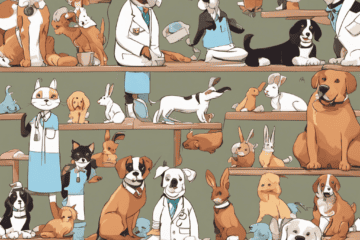Do we lose our value by growing up? Is our value related to beauty? Does the chasing of beauty lead to a better “me” or endless disappointment?
Summer is nearly here, and our screens are flooded with articles offering advice on achieving the elusive “summer body,” glowing skin, and beautiful hair. This constant pressure to transform ourselves isn’t new; it persists year-round. We are bombarded with information on how to appear younger, no matter our actual age. It’s as if we are in a perpetual quest for an unattainable, perfect image, constantly striving to be something we’re not, and never feeling good enough.
This pursuit of an ideal beauty standard seems endless, as we deny our true age, appearance, and unique features. But amidst this relentless chase, we must question the concept of beauty itself. What exactly defines beauty, and who sets these standards?
What Is Beauty?
Everything has beauty but not everyone sees it
Confucius
Beauty cannot be confined to a single definition; it’s a concept that defies narrow boundaries. Though we may broadly consider symmetry and attractiveness when defining beauty, it extends far beyond just appearances. The notion of beauty has a profound impact on numerous individuals worldwide, particularly women.
According to the Oxford Dictionary, beauty is described as “a combination of qualities, such as shape, color, or form, that pleases the aesthetic senses, especially the sight.” Yet, it encompasses so much more than the physical aspect; it delves into the realm of emotions, personality, and individuality. Beauty is a vast and intricate tapestry that captivates our senses and resonates with our souls.
Some argue that beauty comes with pain. But have you ever pondered the true meaning of beauty for yourself? How do you personally define something as beautiful? Is it solely about shape, age, color, and bone structure, or could it be something deeper?
Is your perception of beauty shaped by what you see on social media, the flawless images of celebrities, the emphasis on big bums, big lips for women, or the trend of muscular bodies for men? Or does your concept of beauty extend beyond these superficial ideals?
What Leads People To Do Their Best To Avoid Aging
Aging and undergoing changes is an inevitable part of life, let’s face it. However, we do our best to delay its effects. Some of the reasons driving this pursuit are as follows:
• The fear of being unattractive and ending up alone and lonely. Many believe that beauty equates to attractiveness, and hope it will make people desire to be with us or maintain the affection of someone we care about. However, beauty alone cannot guarantee happiness or love. In reality, even so-called “beautiful people” face their share of unhappiness, just like everyone else.
• The fear of losing job opportunities. It’s disheartening to see job ads prioritizing looks, even for professions where appearance should hold no significance. This emphasis on beauty in the workplace is undeniably sexist, and it’s time we acknowledge it and work towards change.
• Feeling like this is the beginning of the end. We often find ourselves fearful of illness or mortality, forgetting to truly live and enjoy our lives. We restrict our laughter, fearing laugh wrinkles, which, when you think about it, is quite absurd.
In our quest to combat these fears, let’s remember to embrace life fully and appreciate the beauty in each stage, rather than succumbing to societal pressures and unrealistic expectations.
Entertainment Industry And Beauty
Recently, I came across an old interview with one of my favorite singers from 20 years ago. In that interview, she was dressed casually, with imperfect eyebrows, no makeup, and a relaxed and cool body posture. Fast forward to today, and she looks entirely different – like a doll, resembling every other person on TV or social media. She appears “perfect” with a flawless shine, no wrinkles, meticulously styled hair, big eyes, luscious lips, and heavy makeup, among other enhancements.
The prevalence of extraordinarily beautiful people on our screens has a detrimental effect on us – we often find ourselves comparing our appearance with theirs, forgetting the army of professionals behind the scenes who have crafted their image. Makeup artists, hair stylists, dietitians, managers, plastic surgeons, and dentists all contribute to creating this carefully constructed image.
The reason behind this is simple: These people, whether singers, actors, or presenters, are the products themselves. They serve as the means to appeal to potential customers, convincing us to buy the latest creams or try out therapies that promise to keep us eternally youthful. It’s crucial to be aware of these manufactured ideals and remember that true beauty is not defined by the standards set by the media. Instead, it lies in embracing our uniqueness and individuality.
The Marketing Games
Picture a world where every individual, without exception, woke up tomorrow and fully embraced their true selves. In this magical reality, the need for skin products, intense workout programs, and cosmetic surgeries would vanish into thin air. Imagine being content with ourselves just as we are, without any need for external validation or alteration.
In this utopia, global industries heavily reliant on exploiting our insecurities would face complete disruption. Marketing strategies often capitalize on our vulnerabilities, making us believe that we require each product to fit into society’s mold. A perfect illustration of this is the narrative surrounding razors.
However, let’s pause for a moment and ponder the liberating potential of accepting ourselves wholly and unapologetically. The power of self-love and self-acceptance could revolutionize the world, freeing us from the shackles of beauty standards and transforming the very fabric of society.Μarketing strategies are based on our insecurities. They aim to make us feel like we need each product. Α typical example is the story behind the razors.
“Brave” Sarah Jessica Parker And Some More Shining Examples
Amidst the overwhelming pressure to halt aging, the proliferation of filters on social media, and the pursuit of a fake and unattainable perfection, there exist individuals who embrace themselves just as they are. One such inspiring figure is Sarah Jessica Parker, who fearlessly challenges societal norms.
In an interview with Allure, Sarah Jessica Parker expressed her frustration with the constant praise she received for embracing her gray hair. She urged people to shift their admiration towards others who exemplify courage in different aspects of life.
Sarah questioned why women are constantly expected to obsess over aging, unlike men who seldom face similar scrutiny. She challenged the cultural obsession with wrinkles, emphasizing that the passing of time should be celebrated for the wisdom and growth it brings in all aspects of life, be it as a professional, friend, daughter, partner, caregiver, or sister.
Sarah’s poignant words invite us to reevaluate our priorities and move away from superficial concerns about appearance. Instead, she encourages us to focus on embracing our true selves, valuing the richness of experience and personal growth that comes with each passing year.
Julianne Moore Criticizes the Sexist Connotation of “Aging Gracefully”
In 2021, Julianne Moore spoke to As If Magazine about the term “aging gracefully.”
“It’s totally sexist,” the now-62-year-old actress said.
“There’s so much judgment inherent in the term ‘aging gracefully.’ Is there an ungraceful way to age?” she asked.
“No one has an option about aging, so it’s not a positive or a negative thing, it just is. It’s part of the human condition, so why are we always talking about it as if it is something that we have control over?” she continued.
George Clooney Believes Men’s Efforts to Reverse Aging Can Backfire
In a 2015 interview with BBC Radio 4, George Clooney said: “You have a couple of options, which is getting older or dying. And so you have to get used to that idea that your roles in films and who you are and how you’re perceived is going to change. That will disappoint people at times.”
When asked if he’d consider getting cosmetic alterations to appear younger, Clooney responded, “Clearly I haven’t. For me, it’s never been an issue or an option. I don’t think it would make much sense, quite honestly. I’ve seen it happen. Particularly on men, I don’t think it works. I think it makes you look older.
I’m a big believer in the idea that you can’t try to look younger,” he said. “You just have to look the best you can at the age you are.”
Conclusion: How Can You Get Rid Of The Fear Of Aging
Rejecting this feeling is no easy task. Our social media feeds bombard us with seemingly perfect bodies, flawless faces, and impeccable lives, often making us feel inadequate in comparison.
Yet, what we witness on these platforms is often just a well-crafted image, skillfully edited or enhanced by filters. We end up comparing our worst moments with others’ carefully curated best ones.
Marketers also play a role in reinforcing our insecurities, reminding us of the “problems” we should be addressing. To break free from this cycle and improve our body image, we need to look away from these constant comparisons.
Instead, let’s seek inspiration from individuals who encourage self-acceptance and embrace body neutrality. Expanding our knowledge on these concepts can lead to a healthier mindset.
Respecting our bodies means engaging in exercise as a way to connect with them, not to punish them. The same goes for our approach to food; let’s eat when we are hungry and savor every moment, including that delightful dessert shared with friends.
Finding balance is key to feeling better about ourselves and breaking free from the fear of aging. By focusing on self-acceptance and nurturing our well-being, we can find a path to contentment and genuine appreciation for who we are.
And slowly but surely, we should accept the fact that we change. We are getting older, wiser, and more mature. If we are afraid of death or a potential illness or unattractiveness, we forget to live. And life is a river that never returns back or stay stagnant, only flows towards its destination…
Gradually, we must come to embrace the reality of change. As time passes, we grow older, wiser, and more mature. Fearing the inevitable aspects of life, such as aging, illness, or unattractiveness, can overshadow our existence. In doing so, we lose sight of the beauty of living, for life is like a river—it only moves forward, never to return. It flows endlessly, offering us precious moments that should be cherished and celebrated.




